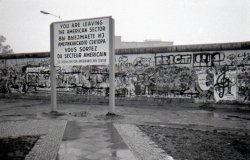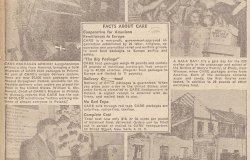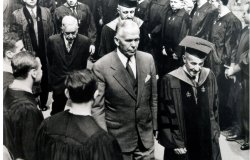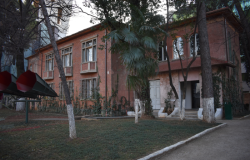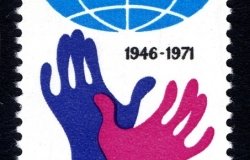The Soviet Bloc as a Project of Globalization
During a discussion held at the Wilson Center, Elidor Mëhilli argued that economic cooperation within the Soviet bloc should be viewed as a project of globalization characterized by intellectual and technical exchanges and implicit competition with the west. Mëhilli, a doctoral candidate in European and Eurasian history at Princeton University, focused on Albania, calling the small country in Southeast Europe an important laboratory for the "socialist experiment" and a useful case study to understand the nature of socialist exchange.
Overview
During a discussion held at the Wilson Center, Elidor Mëhilli argued that economic cooperation within the Soviet bloc should be viewed as a project of globalization characterized by intellectual and technical exchanges and implicit competition with the west. Mëhilli, a doctoral candidate in European and Eurasian history at Princeton University, focused on Albania, calling the small country in Southeast Europe an important laboratory for the "socialist experiment" and a useful case study to understand the nature of socialist exchange.
Mëhilli asserted that Sovietism—or the integration of the Soviet economy—resembled the processes that scholars presently associate with globalization. Economic integration within the Soviet Bloc was a large-scale, top-down project of globalization, beginning first within the borders of the Soviet Union and gradually extending into Eastern Europe and Central Asia. Institutionalized through the Council on Mutual Economic Assistance (COMECON), the Soviet project also had broader implications for communication, trade, and mobility.
The pattern of economic integration pursued by the Soviet Union encouraged bilateral exchanges, scientific cooperation, and the distribution of financial aid. According to Mëhili, the primary goal of the Soviet project was greater economic integration, although the priorities of COMECON shifted as the leadership of its members changed. Until the mid-1950s, COMECON relied primarily on bilateral agreements to pursue exchange and integration, while the "division of labor" occurred later and was met with stiff internal opposition. The first ten years of integration thus consisted mainly of technology transfers, admittedly a Western concept which the Soviets tried to replicate.
Mëhilli explored the case of Albania in depth, arguing that it was exemplary of the problems and prospects of Soviet economic integration as a whole. Small state-owned enterprises replaced businesses, while collectivization forced land owners to give up private property and join cooperative farms. With the help of foreign aid from the Soviet Union, the process of modernization, albeit slow and painful, began. Despite the rift in relations with the USSR following Khrushchev's "Secret Speech" in 1956, Albania's modernization continued to operate under the motto "methoda Sovietika," or employing Soviet methods in every aspect of production.
While countries within the Soviet bloc financed and shifted important technologies to Albania, the country never lived up to Khrushchev's ideal of becoming a developmental model for the broader Muslim world. Albania remained radical and isolated, relying on kinship ties and personal loyalties to pursue development instead of the advice offered by fraternal countries. Mëhilli cited accounts from aid workers, who provide a "ground view" of the Soviet project, to show the limitations of collaboration within the Soviet bloc. Experts and volunteers complained that living conditions and the marginalization of non-Soviet works created impediments to the development of socialist solidarity. According to Mëhilli, the exchange of specialists did not necessarily translate to better relations between Albania and the Soviet Union.
Marc Frey, a Wilson Center Public Policy Scholar and associate professor of history at Jacobs University Bremen, praised Mëhilli's presentation for the depth and quality of its content. Mëhilli successfully integrated a micro-level analysis of Albania's economic development within an assessment of the macro-politics of COMECON. Frey added that while the Soviet project shared certain similarities with globalization in the West, Soviet integration differed significantly with regard to Albania. Albania's tense relations with the majority of the bloc countries limited and circumscribed its integration within the broader Soviet economy.
Frey, commenting on the institutional structure of COMECON, lauded Mëhilli's research for offering a rare insight into the internal dynamics of the secretive organization. Conceived as a network among equal member states, COMECON operated exclusively according to the views of the USSR, leaving little autonomy for its Eastern European partners. Technological exchange, for example, Frey suggested, would not have been possible without the administrative support and approval from the CPSU.
Drafted by James Person, Program Associate and Kristina Terzieva, Program Assistant History and Public Policy Program
Christian F. Ostermann, Director, History and Public Policy Program
Speakers
Hosted By

Cold War International History Project
The Cold War International History Project supports the full and prompt release of historical materials by governments on all sides of the Cold War. Through an award winning Digital Archive, the Project allows scholars, journalists, students, and the interested public to reassess the Cold War and its many contemporary legacies. It is part of the Wilson Center's History and Public Policy Program. Read more

History and Public Policy Program
The History and Public Policy Program makes public the primary source record of 20th and 21st century international history from repositories around the world, facilitates scholarship based on those records, and uses these materials to provide context for classroom, public, and policy debates on global affairs. Read more
Thank you for your interest in this event. Please send any feedback or questions to our Events staff.


